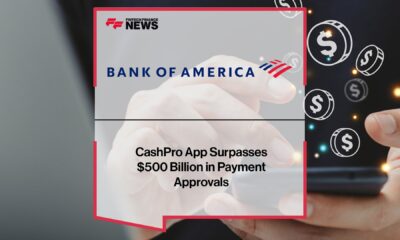Fintech
The rise in awareness of chargebacks and its impact on banks

In today’s digital age, global interest in chargebacks has increased due to the exponential growth of online commerce. Cardholders are increasingly aware of their rights and are ready to initiate chargebacks in the event of dissatisfaction or suspicion of fraud. As consumers become more aware, banks and finance companies face complex challenges when addressing their rights.
As mentioned, we see a growing trend in the growing popularity of chargebacks. This mechanism allows credit card users to dispute charges on their accounts and obtain refunds for transactions made for goods and services that did not meet their expectations or were not received.
Chargeback Chaos: 2 out of 5 Undisputed by merchants
A report from Mastercard shows that chargeback volumes will reach 337 million by 2026a disconcerting one 42% increase. from 2023. According to data from Rightthree out of four Americans and Brits filed a write-off request last year and beyond three-quarters of chargeback handlers reported seeing as many or more chargebacks than in 2022. Due to the complex nature of the dispute resolution process, nearly 60% At least some traders are leaving two out of five chargebacks are undisputedresulting in lost profits.
Chargebacks and challenges for banks
Not surprisingly, the cost of resolving these transaction disputes is enormous and negatively impacts the payments industry billion in revenue. The burden of these costs, which will grow every year, is shared between banks and merchants. Yet the burden of debt collection is often borne by the banks.
Here because.
Typically, if there is a problem with a purchase, the cardholder first attempts to resolve the issue directly with the merchant. If the merchant does not agree to refund or resolve the issue, the cardholder can then initiate a chargeback request with their bank, which will review and possibly cancel the transaction.
This process is supported by the rules of major credit card networks such as Visa and Mastercard. The customer’s bank will request the funds from the merchant’s bank, not the merchant directly. Therefore, funds can still be recovered even if the merchant has gone out of business.
The financial impact and strategic response
With chargeback requests on the rise, banks now find themselves at a crossroads, tasked with streamlining processes and operational costs while firmly safeguarding consumer rights. On a more positive note, increased consumer awareness also presents a unique opportunity to refine chargeback processes. By improving their systems and abandoning manual procedures, which require a lot of resources and money, banks can improve customer loyalty and strengthen the attractiveness of card payments.
An effective response to these challenges requires a multifaceted approach:
#1 Education and awareness
Banks should invest in training both merchants and consumers on the chargeback process to reduce the number of chargeback requests that come through. For merchants, this would include guidance on personalizing the customer experience, such as 24-hour live service, offering free no-questions-asked return policies, and ensuring accurate descriptions of goods and services. For consumers, educational efforts would focus on when a chargeback is appropriate and the consequences of fraudulent disputes.
#2 Improved fraud detection
Financial institutions must continue to improve their fraud detection capabilities. This includes leveraging artificial intelligence and machine learning to identify patterns indicative of chargeback fraud. Fortunately, there is cutting-edge fintech available that can help financial institutions manage fraud detection more effectively and improve their operational efficiency.
#3 Simplified dispute resolution
Simplifying the dispute resolution process can benefit all parties involved. For consumers, a simpler process reduces frustration and builds trust. For merchants, a more efficient system means faster resolutions and less time spent disputing chargebacks. Currently, most banks have outdated software to manage this process; it is still manual and driven by people. The rapid growth of card payments (and therefore also disputes and rule updates) is fueling demand for a digital compliance solution that can help banks save money and retain customers.
#4 Collaboration with merchants
Banks should work closely with merchants to share data and insights related to chargeback fraud. This collaboration can help identify common vulnerabilities and develop industry-wide strategies to combat fraudulent claims.
#5 Political reforms
Financial institutions may need to reconsider their policies regarding chargebacks. This could result in stricter guidelines for initiating a dispute and strengthened verification processes to confirm the legitimacy of a complaint.
As digital payments grow in popularity globally, consumer-initiated chargebacks will also continue to grow as more people become aware of their financial protection rights. Banks are now urged to be more careful and proactive in managing these increases to protect both their operations and their customers in an e-commerce environment.
Managing chargebacks requires investment in technology and the involvement and collaboration of all parties and stakeholders within the payments ecosystem. By putting in place strong preventative strategies, banks and financial institutions can reduce their vulnerability, improve their services and create a safer space for the digital age. Achieving this goal will not only increase customer satisfaction but also strengthen consumer trust in digital payment platforms.
Fintech
Lloyds and Nationwide invest in Scottish fintech AI Aveni

Lloyds Banking Group and Nationwide have joined an £11m Series A funding round in Scottish artificial intelligence fintech Aveni.
The investment is led by Puma Private Equity with additional participation from Par Equity.
Aveni creates AI products specifically designed to streamline workflows in the financial services industry by analyzing documents and meetings across a range of operational functions, with a focus on financial advisory services and consumer compliance.
The cash injection will help fund the development of a new product, FinLLM, a large-scale language model created specifically for the financial sector in partnership with Lloyds and Nationwide.
Joseph Twigg, CEO of Aveni, explains: “The financial services industry doesn’t need AI models that can quote Shakespeare, it needs AI models that offer transparency, trust and, most importantly, fairness. The way to achieve this is to develop small, highly tuned language models, trained on financial services data, vetted by financial services experts for specific financial services use cases.
“FinLLM’s goal is to set a new standard for the controlled, responsible and ethical adoption of generative AI, outperforming all other generic models in our selected financial services use cases.”
Robin Scher, head of fintech investment at Lloyds Banking Group, says the development programme offers a “massive opportunity” for the financial services industry by streamlining operations and improving customer experience.
“We look forward to supporting Aveni’s growth as we invest in their vision of developing FinLLM together with partners. Our collaboration aims to establish Aveni as a forerunner in AI adoption in the industry, while maintaining a focus on responsible use and customer centricity,” he said.
Fintech
Fairexpay: Risk consultancy White Matter Advisory acquires 90% stake in fintech Fairexpay

Treasury Risk Consulting Firm White Matter Alert On Monday he announced the acquisition of a 90% stake in the fintech startup Fair payment for an undisclosed amount. The acquisition will help White Matter Advisory expand its portfolio in the area of cross-border remittance and fundraising services, a statement said. White Matter Advisory, which operates under the name SaveDesk (White Matter Advisory India Pvt Ltd), is engaged in the treasury risk advisory business. It oversees funds under management (FUM) totaling $8 billion, offering advisory services to a wide range of clients.
Improve your technology skills with high-value skills courses
| IIT Delhi | Data Science and Machine Learning Certificate Program | Visit |
| Indian School of Economics | ISB Product Management | Visit |
| MIT xPRO | MIT Technology Leadership and Innovation | Visit |
White Matter Advisory, based in Bangalore, helps companies navigate the complexities of treasury and risk management.
Fairexpay, authorised by the Reserve Bank of India (RBI) under Cohort 2 of the Liberalised Remittance Scheme (LRS) Regulatory Sandbox, boasts features such as best-in-class exchange rates, 24-hour processing times and full security compliance.
“With this acquisition, White Matter Advisory will leverage Fairexpay’s advanced technology platform and regulatory approvals to enhance its services to its clients,” the release reads.
The integration of Fairexpay’s capabilities should provide White Matter Advisory with a competitive advantage in the cross-border remittance and fundraising market, he added.
The release also states that by integrating Fairexpay’s advanced technology, White Matter Advisory aims to offer seamless and convenient cross-border payment solutions, providing customers with secure options for international money transfers.
Fintech
Rakuten Delays FinTech Business Reorganization to 2025

Rakuten (Japan:4755) has released an update.
Rakuten Group, Inc. and Rakuten Bank, Ltd. announced a delay in the reorganization of Rakuten’s FinTech Business, moving the target date from October 2024 to January 2025. The delay is to allow for a more comprehensive review, taking into account regulatory, shareholder interests and the group’s optimal structure for growth. There are no anticipated changes to Rakuten Bank’s reorganization objectives, structure or listing status outside of the revised timeline.
For more insights on JP:4755 stock, check out TipRanks Stock Analysis Page.
Fintech
White Matter Advisory Acquires 90% Stake in Fintech Startup Fairexpay

You are reading Entrepreneur India, an international franchise of Entrepreneur Media.
White Matter Advisory, which operates under the name SaveDesk in India, has announced that it is acquiring a 90% stake in fintech startup Fairexpay for an undisclosed amount.
This strategic move aims to strengthen White Matter Advisory’s portfolio in cross-border remittance and fundraising services.
By integrating Fairexpay’s advanced technology, White Matter Advisory aims to offer seamless and convenient cross-border payment solutions, providing customers with secure options for international money transfers.
White Matter Advisory, known for its treasury risk advisory services, manages funds under management (FUM) totaling USD 8 billion.
Founded by Bhaskar Saravana, Saurabh Jain, Kranthi Reddy and Piuesh Daga, White Matter Advisory helps companies effectively manage the complexities of treasury and risk management.
The SaveDesk platform offering includes a SaaS-based FX market data platform with real-time feeds for over 100 currencies, bank cost optimization services, customized treasury risk management solutions, and compliance guidance for the Foreign Exchange Management Act (FEMA) and other trade regulations.
Fairexpay is a global aggregation platform offering competitive currency exchange rates from numerous exchange partners worldwide. Catering to both private and corporate customers, Fairexpay provides seamless money transfer solutions for education, travel and immigration, as well as simplifying cross-border payments via API and white-label solutions for businesses. Key features include competitive currency exchange rates, 24-hour processing times, extensive currency coverage of over 30 currencies in more than 200 countries, and secure, RBI-compliant transactions.
-

 DeFi11 months ago
DeFi11 months agoSwitchboard Revolutionizes DeFi with New Oracle Aggregator
-

 News11 months ago
News11 months agoLatest Business News Live Updates Today, July 11, 2024
-

 DeFi11 months ago
DeFi11 months agoIs Zypto Wallet a Reliable Choice for DeFi Users?
-

 DeFi1 year ago
DeFi1 year ago👀 Lido prepares its response to the recovery boom
-

 Fintech11 months ago
Fintech11 months agoFinTech LIVE New York: Mastercard and the Power of Partnership
-

 DeFi11 months ago
DeFi11 months agoEthena downplays danger of letting traders use USDe to back risky bets – DL News
-

 Fintech1 year ago
Fintech1 year ago121 Top Fintech Companies & Startups To Know In 2024
-

 Fintech1 year ago
Fintech1 year agoFintech unicorn Zeta launches credit as a UPI-linked service for banks
-

 News1 year ago
News1 year agoSalesforce Q1 2025 Earnings Report (CRM)
-

 ETFs1 year ago
ETFs1 year agoGold ETFs see first outing after March 2023 at ₹396 cr on profit booking
-

 Videos1 year ago
Videos1 year ago“We will enter the ‘banana zone’ in 2 WEEKS! Cryptocurrency prices will quadruple!” – Raoul Pal
-

 Videos1 year ago
Videos1 year ago“BlackRock HAS UNLEASHED a massive multi-trillion monster” – Lyn Alden and Eric Balchunas

















